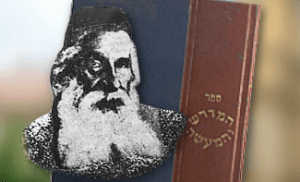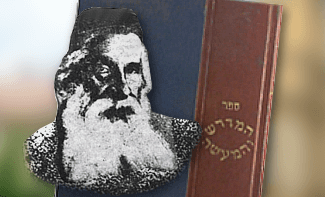
.Pinchas ben Elazar ben Aharon HaKohen turned back My wrath from upon the Bnei Yisrael…Behold! I give him My covenant of peace.[2]
Do we ever deserve any reward for serving Hashem? It depends on how you look at things. We would like to believe that we serve Him by giving of ourselves, our property, our time, our energies, and for this we should reap eternal bliss. There is some truth to this, relative to the behavior of other people who are not so responsive to His expressed Will. Yet something is not quite right. From His perspective, what we give is never fully ours.
“Whoever preceded Me, I can reward, for whatever is under all the heavens is mine.”[3] Chazal[4] take this as a paradox of the undeservedness of any human reward. “Whoever preceded Me in circumcising a son, to whom I did not first give a son?…Who preceded Me by praising Me, to whom I did not first give a neshamah? Who preceded Me by making tzitzis, to whom I did not first give a garment? Who made a maakah, to whom I did not give a roof? Who took terumah, to whom I had not given a crop?
Can we ever serve Hashem, save through what is already His? Even if a person will sacrifice his life for HKBH, he is simply returning the gift of life that belonged to Hashem to begin with. While He does reward us for the performance of mitzvos, it is not that we have fully earned that reward. His practice of rewarding us is sourced in His chesed, not in strict justice. The bottom line is always Divine chesed.
We can, though, get a bit closer to deserving reward than in the examples just cited. All of them deal with material things and physical existence. A person’s spiritual acquisitions are truly his. He earns them through the exercise of his free will. Hashem does not “own” them, because they were never His. He does not interfere with the choices that generated them.
Dovid so yearned to build the beis hamikdosh! He put his heart and soul in the planning and preparation for its construction. But he was told by Hashem that it would not happen in his lifetime. “You spilled much blood! You made great wars! You will not build a house for My name.”[5] Dovid could not build Hashem’s house of peace with hands sullied by bloodshed, even though He assured Dovid that every drop that was spilled had been justified. Taking the lives of all his enemies was necessary, but it conflicted with a mission of peace and harmony.
Pinchas had good reason to kill Zimri. At the moment that he readied himself to accost Zimri, he knew that he might have to pay for it with his life. He also suspected that if he survived, he would be left in the same position as Dovid. The killing would be excused, but he would never again be able to serve as a messenger of peace. In other words, he would be invalidating himself from doing the avodah, and from otherwise serving as a kohen.
This was the concern that our pesukim address. “Pinchas ben Elazar ben Aharon HaKohen” – Pinchas was a kohen. His father was a kohen. His grandfather was the first kohen. The Torah emphasizes his kehunah to reassure Pinchas, to correct his error. Pinchas’ act was so pure, that it did not compromise his role as kohen at all. He remained in his lofty position. Moreover, Chazal add[6] “By din he shall take his reward!” The position of kohen was not simply a hereditary matter, given to anyone fortunate enough to be born into the family. The individual stature of a kohen was a function of the purity of his service in the avodah. Pinchas was prepared to give up well-earned ruchniyus when he rose against Zimri, thinking that he would lose his kehunah. Unlike others, justice – not chesed – would dictate his reward!
How would Pinchas fare today – not in the Heavenly Court, but in the court of public opinion? Very likely, he would have his detractors, particularly with the recent push for community unity. To serve that goal, they advocate looking the other way when they see others openly transgressing Torah norms. Worse yet, they engage in blatant appeasement, arguing that the highest goal that can be served is communal peace. Pinchas, they would argue, was definitely a man of truth – but not a man of peace. The pursuit of truth means opposition from falsehood, and surviving the pitched battles that ensue.
The appeasers are wrong. In the end, truth prevails; Pinchas’ role in history is an honorable one. Hashem does not strip Pinchas of his kehunah. And as part of his reward, Hashem gives him the antidote to his detractors, then and now: “Behold! I give him My covenant of peace.” It is a sharp rebuke to those who believe that genuine peace will be born from the appeasement of evildoers.


